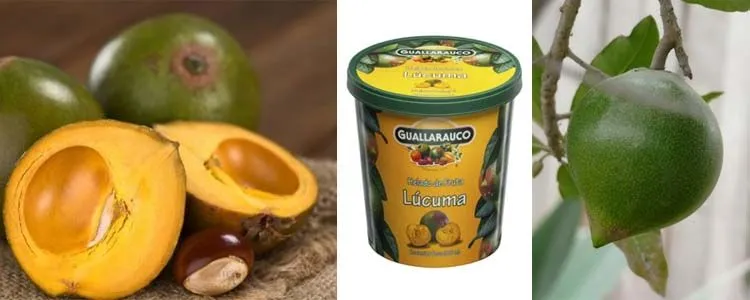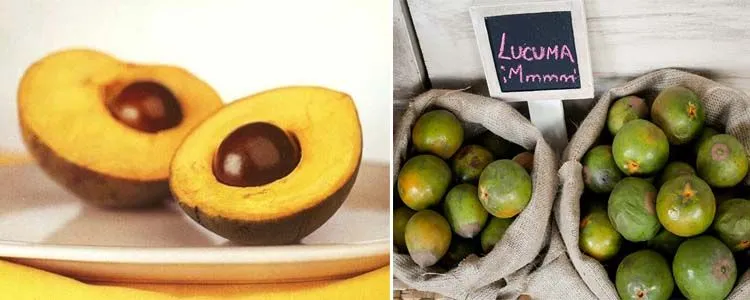Throughout the world we can find a wide variety of exotic fruits full of nutrients and great properties. This is the case of lucuma or lucumo (Pouteria lucuma), a commercially very valuable fruit that is receiving very good evaluations by the scientific community.
The scientific community warns us that we have to increase the intake of fruits and vegetables, valued for their high amount of vitamins, amino acids, antioxidants and fiber. The latter is very important because 8 out of 10 people do not take enough of it (between 28 and 30 g daily are recommended).
With the use of this type of fruit, such as lucuma, we achieve healthy advantages and certified in different clinical trials.
Discover 6 beneficial properties of this exotic fruit.
Table of Contents
What exactly is lucuma?
Lucuma or lucumo, as it is known in some places, is a fruit that belongs to the family of plants Sapotaceae and gender Pouteria. Within this group of plants that produce fruits, lucuma is the most commercially valued and the one that pays the most price for it.
Origin
Lucuma is the fruit of the Pouteria lucuma native to South America. Specifically it is widely used in the Andean valley, in Peru. Due to its sweet taste, it is used to prepare and accompany sweet dishes such as desserts and ice cream.
It was known as the gold of the Incas for its spectacular flavor and sweetness.
Getting to know the lucuma fruit

The fruit ofPouteria lucuma it has a spherical shape but ends in point in the final part. The fruit, which initially has a green color with very small yellow dots, takes on yellow tones as it enters the ripening phase.
When opened, its flesh is buttery and egg yellow, with a central bone very similar to that of the avocado, although smaller and bright brown.
Characteristics of the plant
The lucuma tree is grown in environments of high humidity, subtropical. It has thick leaves and dark green color, similar to avocado or loquat.
Its cultivation requires little care given its rusticity. Currently, for commercial production, those feet that come from cutting are preferred over seed, due to their speed of growth.
The lucuma it can grow quite tall, exceeding 10 and 15 meters in height, since it is a tree of great longevity.
It is evergreen and stands out for the darkness and greenery of its leaves, which last throughout the year. Hence, it is necessary subtropical areas where there is no cold and conserves environmental humidity quite well.
Properties of Lucuma
What interests us in this blog is to obtain nutritional advantages with the consumption of fruits of this type. Therefore, we are going to study what nutritional benefits it would bring us to take 100 grams of this exotic fruit.
1. Nutritional characteristics
Calories and nutrients provided by lucuma
Since it is a fruit that contains many vegetable sugars, let’s see what the consumption of 100 grams of this fruit offers us fresh.
| Nutrient | Contribution |
|---|---|
| Energy | 99 kcal |
| Proteins | 1.5 gr |
| Carbohydrates | 23.5 g |
| Fats | 0.4 g |
| Fibre | 2.3 g |
| Potassium | 343 mg |
| Calcium | 16 mg |
| Sodium | 2 mg |
| Iron | 0.4 mg |
| Phosphorus | 26 mg |
| Vitamin C | 2.2 mg |
| Vitamin B3 | 1.90 mg |
Its vitamin C content is low compared to the contribution of 100 grams of orange (up to 200 mg). However, it has a good ratio of amino acids, the fats it provides are unsaturated (and beneficial for health) and does not contain cholesterol.

Its volume of carbohydrates and sugars provided is high, hence its use in Peruvian cuisine is focused on the preparation of sweets and ice cream.
Hence, it is customary to use lucuma powder extract as a natural sweetener to replace sugar. This is interesting given that the same amount compared to refined sugar contains half the carbohydrates and more fiber.
2. Contains a rich variety of antioxidants
Despite the fact that, at the nutritional level, we stand out for the amount of vitamins and minerals (many of them are below 1% of the RDA), yes its beneficial properties have been investigated by the presence of substances with functional activity.
Among them, some of its antioxidants such as carotenoids and polyphenols can reduce the degradation of free radicals that they cause. cellular oxidation.
In this way, consuming foods rich in antioxidants favors the reduction of diseases linked to the heart. [See information]
Both carotenoids and the set of polyphenols are found in many vegetables and fruits that have been linked to an improvement in cardiovascular health.
Main antioxidants present in Lucuma:
- Ascorbic acid (0.35-1.07 mg/g)
- Phenolic acids (0.7-61.6 mg/g)
- β-carotene (0.22-0.50 mg/g)
Within the group of carotenoids we also find a very important one with antioxidant activity, known as xanthophylls (which give the characteristic yellow color to the fruit). This substance offers positive advantages in eye health, according to medical research.
3. Fiber-rich foods regulate blood sugar
The origin of diabetes can be due to many causes, among them, an abuse of the consumption of simple sugars.
Within carbohydrates, we can divide 3 types: sugars (short chain), starch (longer chains) and fiber (indigestible carbohydrate).
In scientific reviews carried out in patients with type 2 diabetes mellitus, it has been found that the consumption of higher daily amounts of fiber favors the regulation of blood sugar in sick patients and prevention for those who do not have the disease but may have it.
The World Health Organization recommends the consumption of between 25 and 30 grams of fiber. As 100 grams of lucuma provide 2.5 grams of dietary fiber, it is 10% of the recommended minimum, a not insignificant amount.
Other benefits of lucuma against diabetes:
The soluble fiber in lucuma improves insulin sensitivity, limiting blood sugar spikes after high glycemic index meals.
It reduces the activity of the enzyme alpha-glucosidase, which is responsible for the breakdown of carbohydrates into simple sugars that are easily absorbed.
The consumption of this fruit is complementary and compatible with current medicines for diabetics.
Contains a low glycemic index (GI)
In short, the action of lucumo against diabetes is related by its dietary fiber content.
4. Promotes proper cardiovascular health
The content of natural antioxidants mentioned above means that numerous scientific studies have been carried out to corroborate its activity in the protection of the heart.
Polyphenols and carotenes delay the onset of chronic diseases, reduce blood pressure, endothelial dysfunction and modulate energy metabolism.
Consuming polyphenols as healthy dietary components is consistent with the advice to eat five or more servings of fruits and vegetables per day.
A scientific study that collected different samples of Peruvian fruits, observed that lucuma has activity to reduce angiotensin-converting enzyme I (ACE), so that it modulates and regulates blood pressure.
In turn, the extracts of this fruit had inhibitory action of the enzyme alpha-glucosides. [Source of information]
5. Easy to introducer in our diet

Today, we have many simple options to introduce lucuma in our diet. We can find the powdered extract of the fruit, which can be used as a sugar substitute with more than remarkable advantages.
In turn, the fruit can be consumed fresh or used for the preparation of ice cream, desserts, flours or typical sweets.
Known recipes with lucumo
- Lucuma tiramisu
- Lucuma flour
- Lucuma ice cream
- Lucuma mousse
Buy lucuma
One of the easiest ways to consume the beneficial potential of this fruit is through its powdered extract. It has easy conservation and a long expiration date, so we can keep it as the sugar itself.
Most of the lucuma extracts they come in airtight bags of between 100 and 500 grams. When using it, you will have to check the sweetening power it has to add to your recipes.
You have no amount limit or side effects have been documented, but keep in mind that, after all, it has a significant amount of sugars and glycosides.
